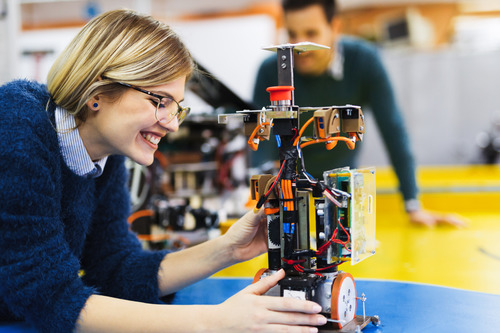
Robotics Vs. AI: Their Differences and the Many Opportunities they Provide
The Artificial intelligence and robotics industry are projected to add $15trillion dollars to the global economy in the next two decades and yes, I did say trillion – now how many zero’s is that again?
So, you can be guaranteed the sector will create a lot of well-paying jobs over the next few years, unfortunately women’s participation in this rapidly evolving industry is less than 20% according to the World Economic Forum.
However in the constantly shifting realm of technology, it can sometimes be difficult to keep the terminology straight—and searching for the tech job you want can also be difficult as a result. If you’re looking for a job in AI, you don’t want to accidentally take time applying to a position in robotics, that may not have any similarities to what you’re looking for. We’ll talk about the distinguishing differences between AI (artificial intelligence) and robotics, and the various opportunities each present.
Although they may be easily confused, AI and robotics are not the same. A robot is something that involves movement and follows simple programmed instructions. Like a train, a robot runs on the rails of its program, it doesn’t vary from that or go beyond that.
AI on the other hand is more “brain-like” in that it is capable of learning and interacting with commands and inputs and offering its own unique response or output. Robots are programmed to do a specific job with efficiency and nothing else. AI is created to learn how to interact naturally and build on its previous programmed knowledge and get better with time. Now that you know the differences between these two fields, let’s get into the career opportunities they present.
Robotics:
For those who have patience, intelligence, and resilience:
If you have endless patience and a drive to finish what might be a tedious and long project, knowing that the reward will be worth it, you might want to investigate robotics engineering. Robotics engineering can be taxing, with many lines of code, many moving parts, and many bugs to fix. It takes extended periods of time to create a robot, so if you’re looking for instant gratification this isn’t it. But robotics engineers can create masterful pieces of machinery that are extremely useful.
For the hands-on people who can’t sit still:
If you don’t have the patience for long robotics engineering projects, you might want to look into being a robotics technician. You’ll be problem solving and fixing the robots physically. If you gain an extensive knowledge of the robots, you might be involved in the design process of the physical parts of new robots, since you’re the one who knows how they break.
For those who have technical knowledge, but a passion for business:
If you know about robots, but just want to be on the business side of things, you might be a perfect fit for a robotics account manager. Every product needs a salesman, including robots. All you need is a proficient knowledge of the robots you’re selling and a well-developed pitch and client development skills.
Artificial Intelligence:

If you have strong programming capabilities and are analytically inclined:
Give machine learning engineering a try. Machine learning engineers must have knowledge of multiple programming languages, be able to see the bigger picture of what they’re creating and be able to visualize how to achieve their machine learning product goals through code. These jobs can require graduate school degrees, but you’ll pay off your college loans quickly with a high median salary.
If you want to optimize business with AI:
If you understand what the world of business needs and you think you have a way to fix it with AI, being a business intelligence developer might work out for you. Business intelligence developers try to nail down market trends using AI so that businesses can operate more efficiently and can adapt quickly.
If your interests extend beyond computer science:

Its worthwhile taking a look at a research scientist role. Research scientists have just as much programming knowledge as the rest of the AI fields, but research scientists generally also carry expertise in some other fields that AI can be applied to. These research scientists with do research and development using models and programs to generate a concept of AI that can solve a problem in their area of expertise.
As you can see, there are many different opportunities in these two fields. One thing that all these positions have in common is that they require technical knowledge and necessary education. Beyond that, you can find a position that fits your personality, background, and interests.
Enjoyed this article let us know your thoughts comment below:
Blogs for you
Half the Sky's mission is to supply the tools that can give every woman the ability to build a successful career and be fully prepared for the future of work. So, that they can lead a healthy, prosperous and more balanced/blended lifestyle of their choosing. By building your confidence, you’re setting foundations to empower yourself and your career. The world is your oyster, and it starts with you.
Enjoyed this article let us know your thoughts in the comments below:
About half the sky
half the sky (HTS) is a career platform for women connecting you to career opportunities at companies that care. Providing you with information, tips and strategies to navigate the rapidly changing workplace.
Sign up to get career tips and job alerts directly to your inbox! Join us to shape the future of women at work together!



